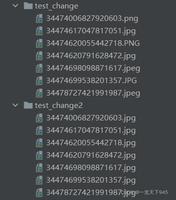Python有哪些实用的脚本?

学过编程的都知道,除了要写代码,测试也是很重要的环节。大家都只听说程序员小哥哥的头发是稀有的东西,那如果测试的速度变快岂不是可以早早下班?今天小编就为大家带来几个Python中几个实用的脚本。
1.解决 linux 下 unzip 乱码的问题。
import osimport sysimport zipfileimport argparses = 'x1b[%d;%dm%sx1b[0m' def unzip(path):file = zipfile.ZipFile(path,"r")
if args.secret:
file.setpassword(args.secret)
for name in file.namelist():
try:
utf8name=name.decode('gbk')
pathname = os.path.dirname(utf8name)
except:
utf8name=name
pathname = os.path.dirname(utf8name)
#print s % (1, 92, ' >> extracting:'), utf8name
#pathname = os.path.dirname(utf8name)
if not os.path.exists(pathname) and pathname != "":
os.makedirs(pathname)
data = file.read(name)
if not os.path.exists(utf8name):
try:
fo = open(utf8name, "w")
fo.write(data)
fo.close
except:
pass
file.close()def main(argv):
######################################################
# for argparse
p = argparse.ArgumentParser(description='解决unzip乱码')
p.add_argument('xxx', type=str, nargs='*', help='命令对象.')
p.add_argument('-s', '--secret', action='store', default=None, help='密码')
global args
args = p.parse_args(argv[1:])
xxx = args.xxx
for path in xxx:
if path.endswith('.zip'):
if os.path.exists(path):
print s % (1, 97, ' ++ unzip:'), path
unzip(path)
else:
print s % (1, 91, ' !! file doesn't exist.'), path
else:
print s % (1, 91, ' !! file isn't a zip file.'), pathif __name__ == '__main__':
argv = sys.argv
main(argv)
2.统计当前根目录代码行数。
import osimport sys
try:
directory = sys.argv[1]
except IndexError:
sys.exit("Must provide an argument.")
dir_size = 0
fsizedicr = {'Bytes': 1,
'Kilobytes': float(1) / 1024,
'Megabytes': float(1) / (1024 * 1024),
'Gigabytes': float(1) / (1024 * 1024 * 1024)}
for (path, dirs, files) in os.walk(directory):
for file in files:
filename = os.path.join(path, file)
dir_size += os.path.getsize(filename)
fsizeList = [str(round(fsizedicr[key] * dir_size, 2)) + " " + key for key in fsizedicr]
if dir_size == 0: print ("File Empty")
else:
for units in sorted(fsizeList)[::-1]:
print ("Folder Size: " + units)
3.扫描当前目录和所有子目录并显示大小。
import osimport sys
try:
directory = sys.argv[1]
except IndexError:
sys.exit("Must provide an argument.")
dir_size = 0
fsizedicr = {'Bytes': 1,
'Kilobytes': float(1) / 1024,
'Megabytes': float(1) / (1024 * 1024),
'Gigabytes': float(1) / (1024 * 1024 * 1024)}
for (path, dirs, files) in os.walk(directory):
for file in files:
filename = os.path.join(path, file)
dir_size += os.path.getsize(filename)
fsizeList = [str(round(fsizedicr[key] * dir_size, 2)) + " " + key for key in fsizedicr]
if dir_size == 0: print ("File Empty")
else:
for units in sorted(fsizeList)[::-1]:
print ("Folder Size: " + units)
4.将源目录240天以上的所有文件移动到目标目录。
import shutilimport sys
import time
import os
import argparse
usage = 'python move_files_over_x_days.py -src [SRC] -dst [DST] -days [DAYS]'
description = 'Move files from src to dst if they are older than a certain number of days. Default is 240 days'
args_parser = argparse.ArgumentParser(usage=usage, description=description)
args_parser.add_argument('-src', '--src', type=str, nargs='?', default='.', help='(OPTIONAL) Directory where files will be moved from. Defaults to current directory')
args_parser.add_argument('-dst', '--dst', type=str, nargs='?', required=True, help='(REQUIRED) Directory where files will be moved to.')
args_parser.add_argument('-days', '--days', type=int, nargs='?', default=240, help='(OPTIONAL) Days value specifies the minimum age of files to be moved. Default is 240.')
args = args_parser.parse_args()
if args.days < 0:
args.days = 0
src = args.src # 设置源目录
dst = args.dst # 设置目标目录
days = args.days # 设置天数
now = time.time() # 获得当前时间
if not os.path.exists(dst):
os.mkdir(dst)
for f in os.listdir(src): # 遍历源目录所有文件
if os.stat(f).st_mtime < now - days * 86400: # 判断是否超过240天
if os.path.isfile(f): # 检查是否是文件
shutil.move(f, dst) # 移动文件
5.扫描脚本目录,并给出不同类型脚本的计数。
import osimport shutil
from time import strftime
logsdir="c:logsputtylogs"
zipdir="c:logsputtylogszipped_logs"
zip_program="zip.exe"
for files in os.listdir(logsdir):
if files.endswith(".log"):
files1=files+"."+strftime("%Y-%m-%d")+".zip"
os.chdir(logsdir)
os.system(zip_program + " " + files1 +" "+ files)
shutil.move(files1, zipdir)
os.remove(files)
以上就是Python中有5个实用的脚本。更多Python学习推荐:云海天Python教程网。
以上是 Python有哪些实用的脚本? 的全部内容, 来源链接: utcz.com/z/529709.html






